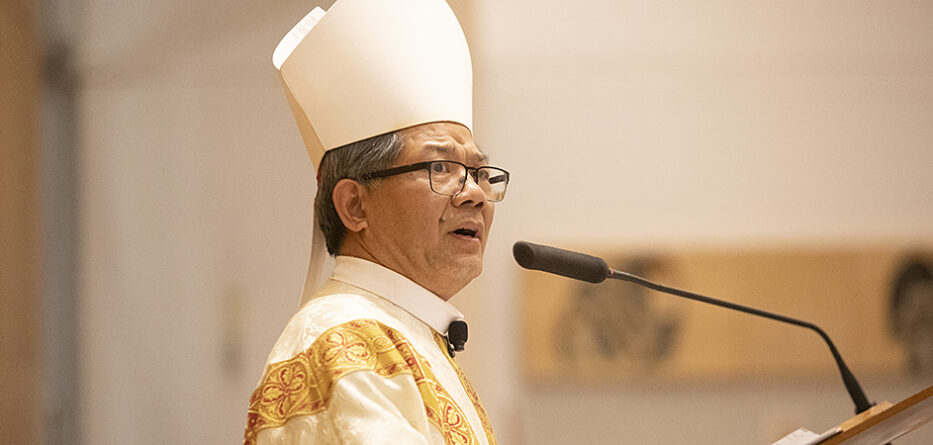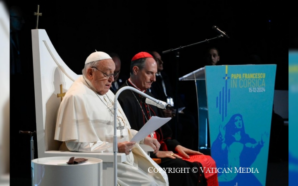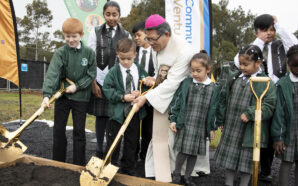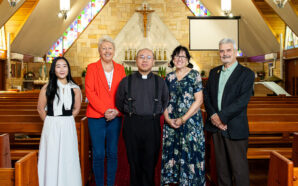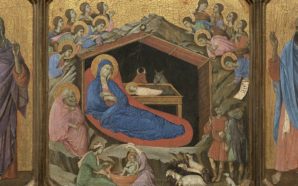Most Reverend Vincent Long Van Nguyen OFM Conv DD STL, Bishop of Parramatta
Homily for the Solemnity of the Ascension of the Lord, Year A 2023
Readings: Acts 1:1-11; Psalm 46(47):2-3, 6-9; Ephesians 1:17-23; Matthew 28:16-20
21 May 2023
Being the continued presence of the risen Christ on earth
Dear friends in Christ,
“Go, therefore, make disciples of all the nations”. With these words, the risen Jesus entrusts to us the task of transforming the world with the leaven of the Gospel. The Ascension that we celebrate today is a threshold moment. It marked the end of the earthly mission of Jesus and the beginning of his disciples. The community of believers empowered by his living spirit are to be his continued presence. Indeed, the Church is a witness to his testament. St Teresa of Ávila writes poetically: “Christ has no body but yours; no hands, no feet on earth but yours.”
Scripture today describes the Ascension in the language of the three-tiered universe of heaven, earth and the underworld. Thus, Jesus was seen to fly into the sky. This was not a change of location as much as a change of state. He exists as a cosmic Lord in a new dimension beyond the realms of space and time. Matthew’s symbolism of the mountain, too, lends itself to a profound theological appreciation. One is reminded of significant moments of God revealing himself to the Israelites on the mountain such as Abraham sacrificing Isaac or Moses receiving the Decalogue. The Ascension, therefore, constitutes a threshold of faith which can no longer be limited to a temple or a nation or a race.
In Galilee, Jesus directs them to a new embodiment of the divine. They are to preach the Good News not only in Jerusalem but to the ends of the earth. Galilee is emblematic of Jesus’ radical, inclusive and boundary-breaking mission. It is where he healed the sick, championed the cause of the oppressed and transformed lives. They are to seek and to be the presence of God’s kingdom beyond the human boundaries. Their new ID card contains not our blood type, gender, nationality, status but the mark of our love and service to others.
“Go, therefore, and make disciples of all the nations”. This is a command not to conquer and dominate, not to assimilate and proselytise. Christendom, and for the most part of Christian history, we have tried to be great, powerful and dominant. Like the disciples who wanted Jesus to restore the political dominance of Israel, we have been complicit in Christian domination at the expense of indigenous peoples and cultures. Instead of sharing God’s compassion and follow the servant Jesus, we have often been guilty of Christian exceptionalism and triumphalism. It was this distortion that Pope Francis recently acknowledged to the Canadian indigenous.
Making disciples of all the nations cannot be other than to imbue the world with the spirit of Jesus. It cannot be other than to make his messianic agenda of healing the sick, binding the wounded, lifting up the lowly and releasing the indebted our own. If we truly emulate Jesus’ unashamed solidarity with the oppressed, we cannot be comfortable quo, especially when the status quo is linked to the oppression of the past, or when it amounts to inhumane treatment of the homeless, the vulnerable and those languishing in offshore and community detention centres.
If we pursue social justice and concern for God’s creation in the name of the Kingdom, we cannot ignore the cry of the poor and the cry of the earth. In the world where people are motivated by short-term gains, Christians work on a long-term plan for a shared destiny of hope, communion and life-flourishing for all. This is the work of the Church and the testament of the risen Jesus.
It is a paradox that the Ascension was the trigger event for the undertaking of this testament. It fortified the Church’s commitment to be the visible presence of Jesus. It launched the Christian movement as a force to be reckoned with in the world, a force not to dominate but to serve, not to rule but to transform from within. It made them realise that if the world had any chance of a new and better future, they would have to be the witnesses to Jesus, his ministry of healing, his outreach of compassion, his courage in standing with the outcast, his audacity in overcoming entrenched attitudes of exclusion and his work for justice.
Brothers and sisters,
It is a daunting task to embody the divine and to be the Body of Christ for the world in which we live. But we are inspired by the example of the early Christian community. In the face of seemingly insurmountable odds, they showed to the world what it was like to be a force for social transformation. Against the ruthless imperial system, they formed an alternative society under God’s rule, a community of radical inclusivity, equity and organised charity.
Let us resolve to be the continued presence of Jesus. Let us go out and make disciples of all nations, acting not like a crusaders’ army but like gentle leaven in the dough. We are on this side of the powerful Christendom. Our task during this time of cleansing and purification is to become what we are meant to be: salt for the earth and light for the world. In the midst of diminishment and powerlessness, we can learn to grow perhaps not numbers but in depth and impact. May the ascended Christ’s promise to be with us be our strength as we carry out his mission on earth.




